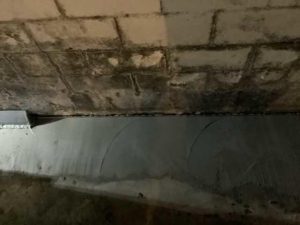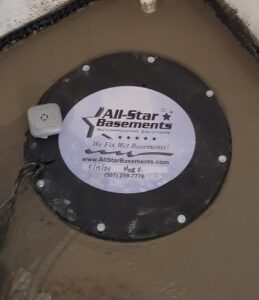
Have you ever considered the value of waterproofing your basement? It’s not just about avoiding the inconvenience of a soggy basement, but it goes way beyond that. It’s about safeguarding your home’s structural integrity, preventing health issues from mold growth, and even boosting your property value. Yes, there’s an upfront cost, but isn’t it worth considering if the long-term benefits and potential savings on future repairs outweigh this initial outlay? Let’s explore this further.
Key Takeaways
- Basement waterproofing helps manage moisture, preventing mold growth and potential health risks.
- Efficient waterproofing systems like sump pumps and French drains direct water away, avoiding structural damage.
- Proactively waterproofing your basement can save on costly future repairs and renovations due to water damage.
- Investing in waterproofing can increase property value by making homes more attractive to buyers and ensuring structural integrity.
- Despite initial costs, the long-term financial and health benefits of basement waterproofing make it a worthwhile investment.
Understanding Basement Waterproofing
Basement waterproofing may sound complex, but it’s quite straightforward once you get the hang of it.
 It’s all about managing moisture and implementing effective drainage solutions. Here’s how it works.
It’s all about managing moisture and implementing effective drainage solutions. Here’s how it works.
To start with, you need to understand the concept of moisture management. It’s not just about keeping water out.
It’s about controlling the amount of moisture that can infiltrate your basement, which can eventually lead to a whole host of problems.
You’ll want to keep the humidity levels low, preventing the growth of mold and mildew, which can damage your belongings and even pose health risks.
Next, let’s talk about drainage solutions.
It’s crucial to have a system that can efficiently direct water away from your home’s foundation.
This could be as simple as using gutters and downspouts to channel rainwater away from your house, or a more comprehensive solution like installing a sump pump.
This device collects excess water and pumps it away from your home, keeping your basement dry.
Potential Risks of a Wet Basement
Ignoring water intrusion in your basement can lead to alarming consequences. You’re not just looking at cosmetic issues, but serious health hazards too.
With a consistently wet basement, mold growth becomes a major concern. These fungi thrive in damp conditions, spreading quickly and silently. Mold exposure can trigger allergic reactions, respiratory issues, and other health problems.
But the risks don’t stop at your health. A wet basement can also cause structural damage to your home. Water seeping into your foundation can erode the concrete, compromise the structural integrity of your house, and even cause it to sink or shift.
This sort of damage isn’t just dangerous—it’s expensive to fix.
And let’s not forget the impact on your property value. Buyers prefer homes with dry, usable basements, so a wet basement can dramatically decrease your home’s market price.
In fact, many potential buyers won’t even consider a property with a known water issue. So, if you’re planning to sell, a dry basement isn’t just a nice-to-have—it’s a must-have.
Benefits of Basement Waterproofing
Given the significant risks linked to a wet basement, it’s easy to see why waterproofing your basement is a smart move.
One of the primary benefits is mold prevention. When water seeps into your basement, it creates a damp environment that’s a perfect breeding ground for mold. This can’t only cause damage to your possessions but also pose a serious health risk. By waterproofing your basement, you’re eliminating the conditions that allow mold to thrive.
In addition to mold prevention, another major benefit of basement waterproofing is the potential increase in your property’s value. Buyers often look at basements with a critical eye, wary of potential water damage that could lead to costly repairs down the line.
A waterproofed basement is a valuable asset that can significantly boost your home’s market price.
 Cost Analysis of Waterproofing
Cost Analysis of Waterproofing
Investing in basement waterproofing might initially seem like a hefty expense.
But before you dismiss it, consider the cost breakdown. It’s not just about the upfront charges but also the long-term savings you stand to gain.
The initial cost of waterproofing can vary greatly based on your home’s size, foundation type, and the extent of the problem. This could range from a few hundred to several thousand dollars.
However, the upfront cost pales in comparison to potential long-term savings.
Think about potential water damage costs. A minor leak can turn into a major problem, leading to mold, structural damage, and health issues. You’d end up spending a fortune on repairs, cleanup, and renovation.
Waterproofing eliminates these risks, saving you from costly recurring issues.
Also, consider the increase in property value. A waterproofed basement is a valuable asset, making your home more attractive to potential buyers.
Making the Final Decision
After weighing the cost implications and long-term benefits, it’s time to make your final decision on basement waterproofing.
Remember, it’s not just about the immediate expenses but also the potential benefits down the line.
Consider waterproofing as a long-term investment for your property. Yes, the upfront cost might be significant, but the peace of mind and the potential boost in property value can outweigh the initial outlay.
Waterproofing your basement can protect your home from water damage, mold, and mildew that can compromise structural integrity. This proactive measure helps maintain your home’s condition, ensuring it stays sturdy and sound for years to come.
Moreover, a dry, usable basement might add to the overall living space of your home, potentially increasing its value.
Buyers are likely to be more attracted to a property with a well-maintained, waterproofed basement than one with a damp, moldy one.
Frequently Asked Questions
What Are the Best Basement Waterproofing Products Available in the Market?
You’re probably wondering about the best basement waterproofing products on the market.
There’s a wide variety to choose from. Some popular options include basement sealants and moisture barriers.
Sealants are great for handling minor leaks, while moisture barriers are useful for controlling dampness.
Remember, it’s crucial to pick the right product based on your basement’s specific needs.
Don’t rush your decision; take your time and do some research.
Can I Do Basement Waterproofing on My Own or Do I Need a Professional?
Yes, you can undertake basement waterproofing on your own using DIY techniques.
It’s cost-effective and gives you hands-on control. However, it’s important to understand the process thoroughly.
Professional assessments are crucial if you’re unsure about the extent of the problem. They’ve got the experience and tools to accurately diagnose and resolve complex issues.
How Long Does a Typical Basement Waterproofing Process Take?
You’re wondering about the time factors involved in basement waterproofing.
It typically depends on the process steps. A simple sealant job can take a couple of days, but a full internal or external waterproofing job could span a week or more.
Remember, it’s not just about the actual work; you’ll also need time for preparation and cleanup.
Does Home Insurance Cover Basement Waterproofing Costs?
Generally, home insurance policies don’t cover basement waterproofing costs.
It’s considered a home maintenance issue, not an unforeseen accident or disaster. However, you should review your policy’s coverage options.
Some might include water damage, but typically it’s for sudden incidents like a burst pipe, not seepage.
It’s best to discuss this with your insurance agent to get an accurate understanding of what’s covered.
What Maintenance Is Required After My Basement Is Waterproofed?
After your basement is waterproofed, regular maintenance is key to keeping it dry.
You’ll need to conduct post-waterproofing inspections annually, ensuring the waterproofing system is working properly.
Install a moisture monitoring system, allowing you to detect any increase in humidity early.
Keep an eye on gutters and downspouts, and make sure your landscape slopes away from your home.
Don’t neglect these steps. Your basement’s health depends on them.
So, is basement waterproofing worth it? Absolutely. Despite the upfront costs, it’s a savvy investment that pays off in the long run. You’ll dodge major repair bills, boost your home’s value, and create a healthier living environment. Don’t let the fear of initial expenses deter you. Remember, you’re not just waterproofing your basement, you’re safeguarding your home. Make the smart choice and invest in basement waterproofing today.

All-Star Basements is Locally Owned and Operated and based out of Rochester, Minnesota. We cover Southern Minnesota including the Twin Cities area, Western Wisconsin and parts of Northeast Iowa. Our team is committed to solving our customers’ basement waterproofing, foundation repair, or crawl space needs and offering multiple solutions to choose from.
As a proud member of the Basement Health Association and the National Waterproof Members of America, we have the best products available to solve your leaky basement, seepage, or flooding issues. Our lineup also includes multiple crawl space solutions.
If you have foundation problems that need any kind of repair, we can help! We feature the nationally renowned Grip-Tite Foundation Systems, which has a long history over 90 years of fixing homeowners’ foundation repair issues- from walls that are buckled, tipping or cracked and bowing.
At All-Star Basements, we are committed to providing multiple solutions to choose from to help fix any basement problem you may have. We are very proud of our Better Business Bureau A+ rating and take great pride in caring for all of our customers’ needs- big or small, we do it all!